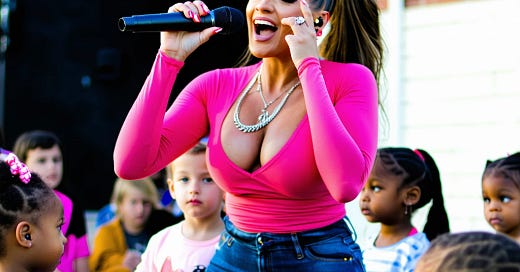In 2009, popular music lyrics were three times more likely to contain sexual content than in 1959, a trend that has only intensified. This shift prompts a critical question: does the music industry shape American culture, or does American culture shape the music industry? The increasing sexualization of music, evident in the provocative lyrics of female rappers, the controversial output of groups like 2 Live Crew, and the evolving persona of artists like Janet Jackson, underscores this complex interplay.
The sexualization of music lyrics has grown steadily over decades. A study analyzing Billboard Hot 100 songs from 1959 to 2009 found that sexual references increased significantly, with 37% to 75% of lyrics and videos containing such content by the 2000s. Genres like hip-hop, rap, and R&B led this trend, with 90% of mixed hip-hop and R&B videos featuring sexual themes by 2011. This escalation reflects broader cultural shifts, such as the sexual revolution of the 1960s and 1970s, but also suggests the industry’s role in amplifying these changes to capture market attention. This raises concerns about music’s departure from its role as a moral guide, potentially normalizing behaviors once considered inappropriate. Some might argue that the industry targets the most vulnerable with the most harmful content.
The rap group 2 Live Crew exemplifies the music industry’s influence on cultural sexualization. Formed in Miami in 1985, the group initially produced relatively tame hip-hop but gained notoriety with their 1989 album As Nasty As They Wanna Be, featuring explicitly sexual tracks like “Me So Horny” and “The Fuck Shop”. The album’s provocative lyrics and the group’s hyper-sexualized image—marked by suggestive performances and explicit album art—courted controversy, leading to legal battles over obscenity in 1990. This shift aligned with the industry’s growing appetite for shock value in hip-hop, reflecting cultural openness to sexual expression. 2 Live Crew’s success highlights the industry’s role in pushing boundaries, prioritizing profit through sensationalism over moral restraint, and contributing to a coarsening of cultural norms.
Female rappers have become pivotal in shaping contemporary music, often through sexually explicit lyrics. Pioneers like MC Lyte in the 1980s challenged male dominance with versatile themes, but modern artists like Nicki Minaj, Cardi B, and Megan Thee Stallion have embraced overt sexuality. Songs like Cardi B’s “WAP” and Megan Thee Stallion’s “Big Ol’ Freak” celebrate sexual agency, earning both commercial success and criticism. Supporters argue this empowers women by reclaiming narratives in a male-dominated genre, yet critics contend it reinforces objectification. This trend alarms those worried about the erosion of modesty and its influence on young women, who may internalize these portrayals as societal expectations. Studies suggest exposure to such lyrics correlates with permissive sexual attitudes among adolescent girls, amplifying these concerns.
Janet Jackson’s career further illustrates the industry’s influence on artists’ personas. In the 1980s, Jackson rose to fame with albums like Control (1986), which emphasized empowerment and independence with relatively restrained themes. However, by the 1990s, albums like Janet (1993) and The Velvet Rope (1997) embraced more sensual lyrics and imagery, with songs like “That’s the Way Love Goes” and provocative music videos showcasing a bolder, sexualized image. Her shift—marked by revealing outfits and suggestive choreography—aligned with industry trends toward sexualized content in pop and R&B, reflecting market demands for a more provocative persona. This transformation, while artistically bold, raises questions about the industry’s pressure on artists to conform to sexualized trends, potentially compromising artistic integrity and contributing to cultural shifts that prioritize sensuality over substance.
The music industry, controlled by corporations prioritizing profit, significantly shapes American culture. With 70% of the industry dominated by major labels, success is often measured by sales, encouraging the production of attention-grabbing, sexualized content. Studies show that exposure to sexual lyrics influences youth behavior, with adolescents exposed to such content being over twice as likely to engage in early sexual activity. This suggests the industry’s role in normalizing sexual themes, potentially undermining traditional family values, fostering a culture of permissiveness that clashes with principles of restraint and respect.
Conversely, American culture’s evolving attitudes toward sexuality have shaped the music industry. The sexual revolution, feminist movements, and growing acceptance of diverse expressions have created a permissive environment for explicit content. For instance, the rise of hip-hop in the 1970s reflected urban African American experiences, including themes of rebellion and sexuality. Female rappers’ embrace of sexual lyrics can be seen as a response to cultural shifts toward gender equality, allowing women to assert control over their narratives. However, while culture enables such expressions, the industry amplifies these trends beyond organic evolution, exploiting societal openness for profit and accelerating shifts in societal norms.
The sexualization of music raises significant concerns. The objectification of women, prevalent in genres like hip-hop and pop, risks perpetuating stereotypes that undermine dignity and equality. The relationship between the music industry and American culture is reciprocal, yet the industry’s influence appears particularly potent. While cultural shifts enable such content, the industry’s amplification raises significant concerns, particularly regarding moral erosion and youth influence. As music continues to define cultural identity, society must reflect on the values it endorses, ensuring that artistic expression aligns with principles of respect and responsibility.
Sources:





